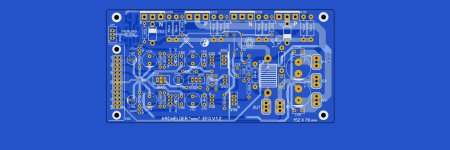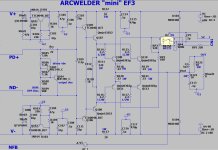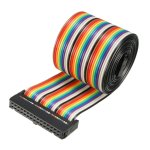Thanks for the info. All that really matters is that you are happy with the sound and you have good value in your purchase.
Just 100$ for a noticeably better sub. I wish I went this route to begin with instead of trying various OEM offerings.
This sort of mirrors the superiority of our DIY amps over the OEM's , but to a greater degree . This 12" TOTALLY outclasses
the polk sub I have - not even in the same ballpark !!
This sort of mirrors the superiority of our DIY amps over the OEM's , but to a greater degree . This 12" TOTALLY outclasses
the polk sub I have - not even in the same ballpark !!
"Arcwelder mini EF3" is fully done with BOM.
1. Added "Rcc" - the Vbe smoothing resistor (below). Really fine-tuned the layout.
2. The Opto addition is permanent , protection is important.
3. No small holes , I saved money by not using the "preci-dip" 6$ 2X14 female. The Wurth 3$ one is better. But , the hole is 1mm.
This "ecosystem" of amps is going to be my LAST ! I really can't see any improvements (post Wolverine) , except for protection and
other accessories that can be added .... preamp/meters .. etc.
This is the only forum or social media I participate on , the internet is quickly turning into a "pay to play" $hithole ... kind of lost my
enthusiasm for it - these days ?? I actually can see the day I will "pull the plug" - yikes.
OS
1. Added "Rcc" - the Vbe smoothing resistor (below). Really fine-tuned the layout.
2. The Opto addition is permanent , protection is important.
3. No small holes , I saved money by not using the "preci-dip" 6$ 2X14 female. The Wurth 3$ one is better. But , the hole is 1mm.
This "ecosystem" of amps is going to be my LAST ! I really can't see any improvements (post Wolverine) , except for protection and
other accessories that can be added .... preamp/meters .. etc.
This is the only forum or social media I participate on , the internet is quickly turning into a "pay to play" $hithole ... kind of lost my
enthusiasm for it - these days ?? I actually can see the day I will "pull the plug" - yikes.
OS
Attachments
These are great designs and lots of people on this forum really appreciate your work! There's alway another improvement to be made 😉 I've also been a bit put off by the lack of openness on some projects lately.
I hope you continue with new projects. I'm a fan of your work. I often simulate them to learn how they work. I have a degree in law, but I've always liked audio electronics precisely because it's hard to find good home amplifiers sold in stores. I hope your work here on the forum continues for a long time.
i gota jolt of exhilaration with your post presenting the Arcwelder mini THANK YOU,i also share the other members sentiment of appreciation for sharing all your hard work for us to enjoy.......THANKS AGAIN
PS....dont pull the plug......yikes
PS....dont pull the plug......yikes
Thank you guys , I did not not mean I will design nothing ... just all will be in THIS ecosystem. I also do drones and led lighting.
I have recently adopted all the MCU's (ESP/amtel). l like little 'puters !
I'm really amazed by speakers. Thiel and Small were spot on in predicting driver mechanical responses.
As far as projects , I still have the big "arcwelder" (my sub needs "grunt"). I might keep it <300mm with 5 closely spaced
outputs.
And , there are the Symasui/Infidel as the other IPS's.
The only new designs are the "Eyesee" (below) .... and the protection circuit.
OS
I have recently adopted all the MCU's (ESP/amtel). l like little 'puters !
I'm really amazed by speakers. Thiel and Small were spot on in predicting driver mechanical responses.
As far as projects , I still have the big "arcwelder" (my sub needs "grunt"). I might keep it <300mm with 5 closely spaced
outputs.
And , there are the Symasui/Infidel as the other IPS's.
The only new designs are the "Eyesee" (below) .... and the protection circuit.
OS
Attachments
Here is the big amp. Think (5 pair) Toshiba TTA1943/TTC5200 will run a 500W-4R sub ?
Those Toshiba's are 20.5mm wide , just 3mm between devices is left. Emitter resistors can be those
"classic" 3-5W ebay ceramic devices (below). I've seen those as cheap as $.50 each.
They do make 12.5mm LS ceramic (non-inductive) but charge "audiophile" prices for them ?
At least Digikey/Mouser have those cheap outputs - ($2.70) , I noticed a shortage of ONsemi (NJW/MJE).
Nothing wrong with Toshiba....
OS
Those Toshiba's are 20.5mm wide , just 3mm between devices is left. Emitter resistors can be those
"classic" 3-5W ebay ceramic devices (below). I've seen those as cheap as $.50 each.
They do make 12.5mm LS ceramic (non-inductive) but charge "audiophile" prices for them ?
At least Digikey/Mouser have those cheap outputs - ($2.70) , I noticed a shortage of ONsemi (NJW/MJE).
Nothing wrong with Toshiba....
OS
Attachments
If you want "biggie" , the drivers are OUTPUTS.
I used fast , high Hfe Sanken's for my "Slewmaster" arcwelder. NO "droop" with a pair of 125W devices
as driver in this EF3.
2SC6145 and 2SA2223 are 60mhz/100+ Hfe , and 250 pf Cob. As good or better than many small TO-220
driver pairs. https://www.semicon.sanken-ele.co.jp/sk_content/2sc6145_ds_en.pdf
2SA1294/2SC3263 is in stock (digikey) and similar at 60mhz. Outputs that I've used that make fine drivers.
It seems no one company has both P and N , but you could mix and match for drivers,
Basic matching is more critical for the outputs so there will be no "current hogging".
OS
I used fast , high Hfe Sanken's for my "Slewmaster" arcwelder. NO "droop" with a pair of 125W devices
as driver in this EF3.
2SC6145 and 2SA2223 are 60mhz/100+ Hfe , and 250 pf Cob. As good or better than many small TO-220
driver pairs. https://www.semicon.sanken-ele.co.jp/sk_content/2sc6145_ds_en.pdf
2SA1294/2SC3263 is in stock (digikey) and similar at 60mhz. Outputs that I've used that make fine drivers.
It seems no one company has both P and N , but you could mix and match for drivers,
Basic matching is more critical for the outputs so there will be no "current hogging".
OS
All of it , I am personally using this design for my sub. The "Wolverine" only uses TO-220 as drivers. I might want toNow that is the beast I was hoping for, thank you. Are you posting Gerbers and asc?
run a 2R load.
PS - I'm going to add base-stopper pads for the drivers and a few super fat traces to make this "sub friendly".
mouser will have the NJWs OPTs next month, would you still specify the toshibas if the NJWs were available since you originally specified then in the schematic?
Spec wise -mouser will have the NJWs OPTs next month, would you still specify the toshibas if the NJWs were available since you originally specified then in the schematic?
Toshiba -
-larger surface area (TO-264)
-lower Cob (200/320pF)
-cheaper
-About the same SOA (current).
- "O" grade is typically >100Hfe , typical 80 @ 6A ... not sure what 60V would be (never used them).
ON semi (NJW) -
-smaller package
-higher Cob (400pF+)
-pricy and OUT OF STOCK !!
-No specs about Hfe (at 60V) , most were 50.
Never built anything with the Toshiba's , they should perform exactly like the ON NJW's.
I'm not sure what grading quality Toshiba has , ON (NJW) was not great with my slewmasters.
I would always need to go through a pile to get anything close with some left over.
For some reason Toshiba describes the 5200/1942 pair as "Recommended for 100-W high-fidelity audio frequency amplifier" ?
The NJW's , I would not rate a single pair EF stage for >60W. My HK has 2 pair and it is rated @ 105W/8R.
They should be the same if you interpret the whole spec sheet , one would sub the other (besides package style).
I'm cheap , 37$ for 15 devices ... why not ?
Edit - lower Cob would equal a .47uF C112 (suckout cap). Otherwise, no difference.
OS
Hmmm , specs are different on a Fairchild 5200/1942 pair. I wonder whether Toshiba
uses a different process/die than Fairchild did ?
OS
uses a different process/die than Fairchild did ?
OS
BTW , here is how this whole "ecosystem" will connect -
1. = Vbe and any protection connection - overcurrent/power board control (below 1)
MTA 100 locking 3 pin
2. = OPS to IPS can either be a fixed right angle or straight 28 pin. A neat option is a ribbon cable connector (below 2).
you will be able to mount the IPS right at the back panel if you wish.
(PD+/ND-) are relative low impedance , V+/V- ...the same
PASS labs can do it (below 3) , so can I.
PASS and Parasound were the original inspiration(s) for my Slewmaster projects. I like how the center ribbon cable
is the digital volume and protection circuitry , ALL low level analog is right at the back panel - everything is away from that massive toroid.
And ... we don't have to pay $11,000 USD for it !
1. = Vbe and any protection connection - overcurrent/power board control (below 1)
MTA 100 locking 3 pin
2. = OPS to IPS can either be a fixed right angle or straight 28 pin. A neat option is a ribbon cable connector (below 2).
you will be able to mount the IPS right at the back panel if you wish.
(PD+/ND-) are relative low impedance , V+/V- ...the same
PASS labs can do it (below 3) , so can I.
PASS and Parasound were the original inspiration(s) for my Slewmaster projects. I like how the center ribbon cable
is the digital volume and protection circuitry , ALL low level analog is right at the back panel - everything is away from that massive toroid.
And ... we don't have to pay $11,000 USD for it !
Attachments
ok thanks for the analysis, i agree, why not Toshiba. I'll probably install 1 pair per board since each board will be driving only a single driver each in an active set up. Maybe 75 watts 8ohms. and with 1 pair no matching required.do you recommend matching the other transistors or other components? you mentioned something about protection. What are we doing with that?
I'm adding the Opto's to the power board and both OPS's , so we won't be up $hit creek later. These boards can run "raw" (no protection) , or
fully embellished.
I fully intend to run all 3 of my amps without protection initially , the fuses will suffice.
You might as well fully populate the mini with it's 4 devices - they are cheap. 4 devices will deliver much lower THD , especially if your speaker
dips low (impedance).
As far as matching .... you will notice it does matter more with 4 than 2 (outputs). But , this design minimizes this by being (P/N/P/N).
The servo will compensate for any mismatch (offset) , but you will gain performance the closer you get. N to N and P to P will be nearly
"SMD perfect" in the IPS's.
For both the Spook and hellraiser , RED led Vf (1.8V) will be critical to set currents to spec. Otherwise , these circuits are pretty "idiotproof".
OS
fully embellished.
I fully intend to run all 3 of my amps without protection initially , the fuses will suffice.
You might as well fully populate the mini with it's 4 devices - they are cheap. 4 devices will deliver much lower THD , especially if your speaker
dips low (impedance).
As far as matching .... you will notice it does matter more with 4 than 2 (outputs). But , this design minimizes this by being (P/N/P/N).
The servo will compensate for any mismatch (offset) , but you will gain performance the closer you get. N to N and P to P will be nearly
"SMD perfect" in the IPS's.
For both the Spook and hellraiser , RED led Vf (1.8V) will be critical to set currents to spec. Otherwise , these circuits are pretty "idiotproof".
OS
I used the Toshibas 1942/5200 in my 8 ch leach amp for about 20years without a problem. I used a pair with 56+56VDC.
- Home
- Amplifiers
- Solid State
- Spooky and Hellraiser SMD 60W amps (Wolverine compatible IPS)






